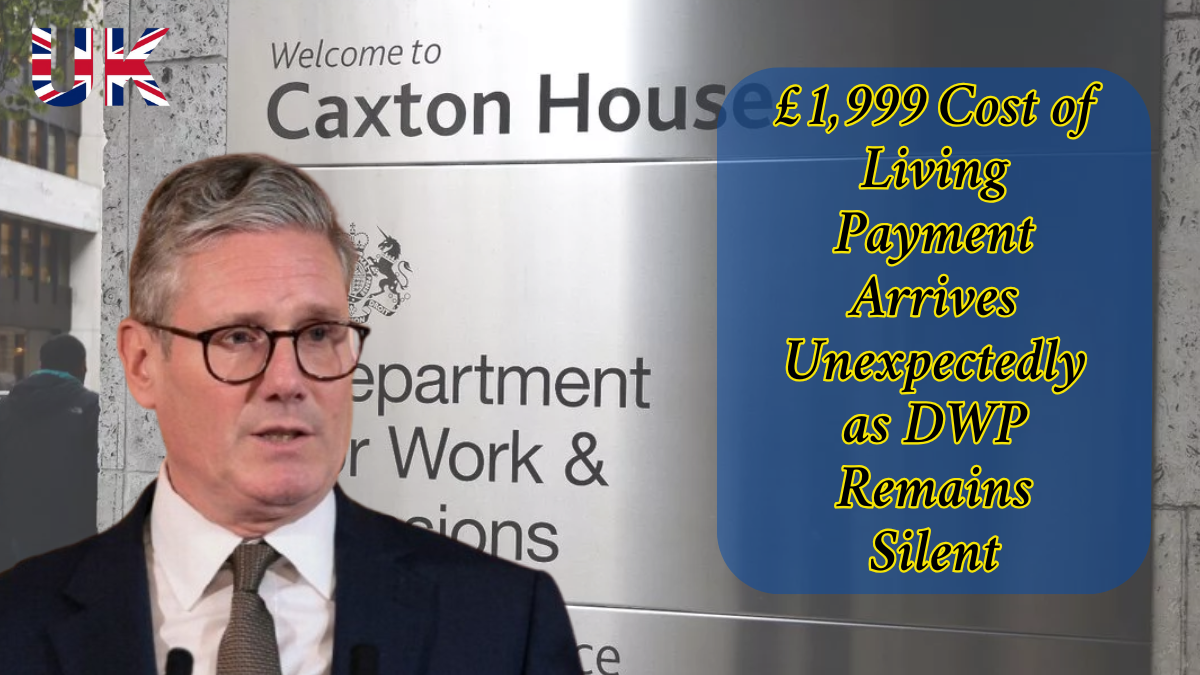The Department for Work and Pensions (DWP) has confirmed a new £1,999 Cost of Living Payment for 2025, providing critical financial support to millions of struggling UK households. This new payment comes amid soaring costs for energy, food, and housing, but the government has remained largely silent on the details beyond the initial confirmation.

If you are wondering whether you qualify or when you can expect the payment, this article covers everything you need to know.
Quick Summary: New £1,999 Cost of Living
| Topic | Details |
|---|---|
| Payment Amount | £1,999 |
| Issued By | Department for Work and Pensions (DWP) |
| Target Groups | Low-income individuals, disabled persons, carers |
| Payment Schedule | Spring, Summer, Autumn 2025 |
| Eligibility | Receipt of qualifying benefits |
| Application Required | No, payments are automatic |
| Official Site | gov.uk |
What is the New £1,999 Cost of Living Payment?
The Extra Cost of Living Payment is a one-time, tax-free cash support issued to eligible recipients without the need for a separate application. Unlike regular benefits, this payment is a standalone boost aimed at helping those most impacted by the ongoing cost-of-living crisis.
It is part of the broader strategy started in 2022 to shield vulnerable groups from the worst effects of inflation and economic instability. The payment will assist with urgent expenses, including:
- Rent and housing costs
- Energy bills
- Food and essentials
- Household supplies
Why Was This Extra Payment Introduced?
Inflation continues to strain the budgets of millions. Food prices, energy costs, housing expenses, and transport have seen sharp increases, making it harder for low- and middle-income families to make ends meet.
By providing a large, direct cash injection, the government aims to:
- Prevent extreme financial hardship
- Support those on fixed or low incomes
- Sustain economic stability by maintaining household spending
This move complements earlier efforts to offer direct support during periods of high inflation without requiring beneficiaries to navigate complicated application processes.
Who Will Receive the £1,999 Payment?
Only individuals currently receiving qualifying benefits during the specified eligibility periods will receive the payment. The qualifying benefits include:
- Disability Living Allowance (DLA)
- Universal Credit
- Income Support
- Personal Independence Payment (PIP)
- Jobseeker’s Allowance (JSA)
- Pension Credit
If you are receiving one or more of these benefits during the qualifying period, the payment will be deposited directly into your bank account.
Payment Schedule for 2025
The £1,999 payment will be divided into three phases to better distribute financial support throughout the year:
1. Spring 2025 (March – May)
A base payment will be sent to all eligible individuals.
2. Summer 2025 (July – August)
An additional payment of up to £200 will be issued to targeted vulnerable groups.
3. Autumn 2025 (October – December)
A final top-up payment will complete the £1,999 total support package.
Each phase is designed to deliver help when expenses are typically higher, such as during peak energy use in colder months.
How Payments Will Be Made
The DWP will automatically transfer payments into the same bank account where you already receive your regular benefits. No action is needed unless:
- You have changed your bank account recently.
- Your benefit status changes significantly.
Important Reminders:
- Verify your banking details with DWP or HMRC.
- Monitor your account during the payment windows.
- Keep official benefit letters as proof of eligibility in case of discrepancies.
Rising Costs and the Need for Support
Data from the Office for National Statistics (ONS) shows how sharply costs have risen over the past year:
| Expense Category | Average Annual Increase |
|---|---|
| Energy | 7.2% |
| Food | 8.1% |
| Housing | 5.4% |
| Transport | 6.3% |
These increases mean that the £1,999 payment will provide vital relief, particularly for households balancing multiple rising expenses at once.
How to Protect Yourself from Scams
The DWP has issued warnings about potential scams targeting benefit recipients. Remember:
- You do not need to apply for this payment.
- DWP will never ask for your personal banking details via text, email, or unsolicited calls.
- Always verify information through official government sources like gov.uk.
If you are contacted by someone claiming to offer help in securing your payment, report it to Action Fraud UK.
FAQs About the New £1,999 Cost of Living Payment
1. When will the payments be made?
Answer: Payments will be made in three phases: Spring (March–May 2025), Summer (July–August 2025), and Autumn (October–December 2025).
2. What should I do if I do not receive the payment?
Answer: First, check your bank account. If the payment is missing after the relevant window closes, contact the DWP directly through their official portal.
3. Who qualifies for the £1,999 Cost of Living Payment?
Answer: Individuals receiving qualifying benefits such as Universal Credit, PIP, DLA, Income Support, JSA, or Pension Credit during the eligibility periods.
4. Do I need to apply for this payment?
Answer: No. The payment will be made automatically to eligible recipients based on their current benefit records.
5. Where will the payment be sent?
Answer: The funds will be deposited into the same bank account where you currently receive your regular benefits.
6. Will this affect my other benefits?
Answer: No. The £1,999 payment is tax-free and does not count as income for the purposes of calculating your other benefit entitlements.
Final Thoughts
The unexpected arrival of the £1,999 Cost of Living Payment offers much-needed financial relief to millions across the UK. With inflation still squeezing household budgets, this one-time, automatic payment ensures that vulnerable groups receive direct help without complicated application processes.
If you are eligible, be sure to monitor your bank account, verify your details with DWP, and stay vigilant against scams. For the most up-to-date information, always refer to the official gov.uk website.
For More Information Click Here